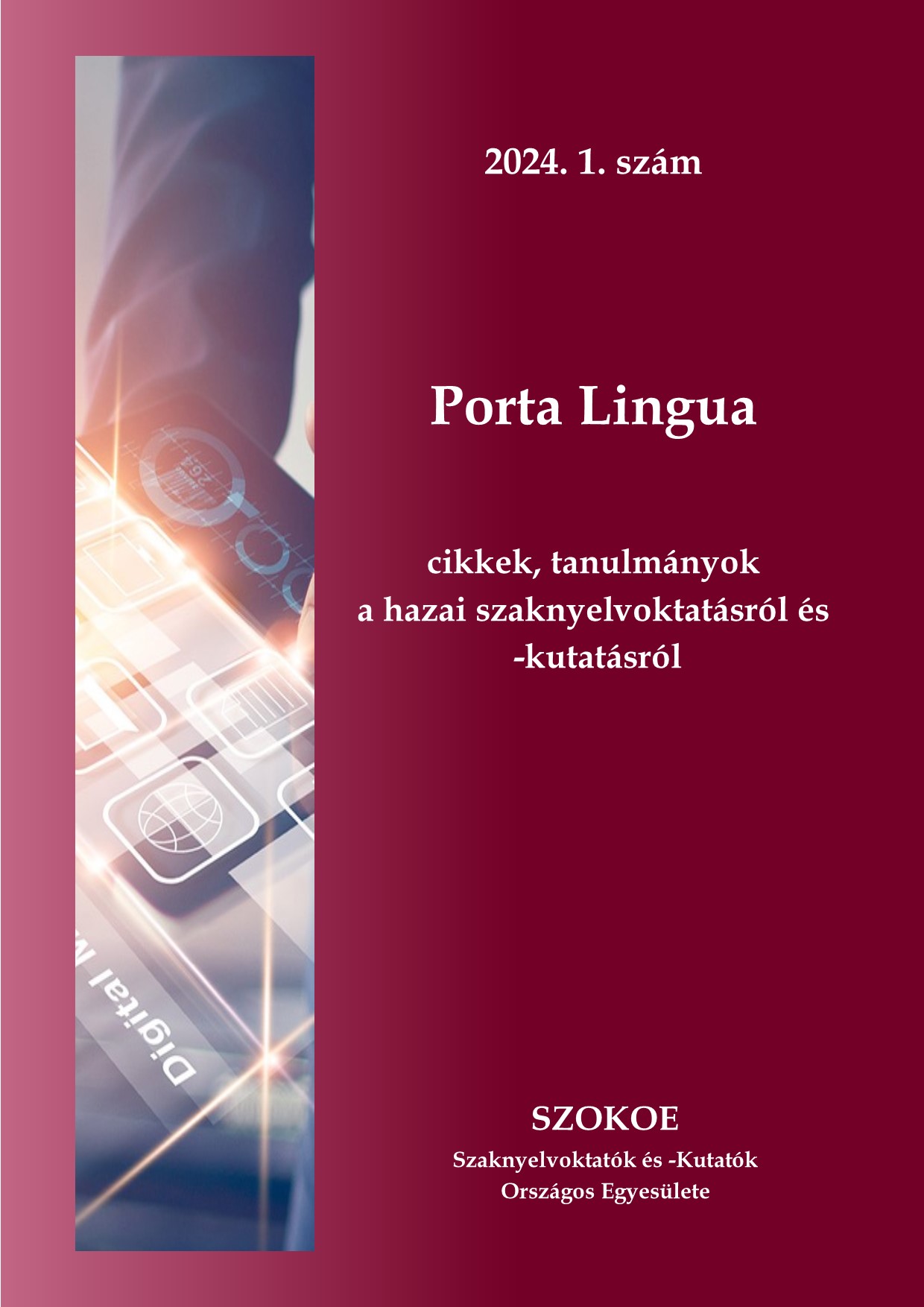Gyakorlatorientált szaknyelvoktatás
Absztrakt
A szaknyelvoktatás jelentősége a felsőoktatási intézményekben vitathatatlan, mert egyrészt a tanulmányok befejezésének alapkritériuma, másrészt megalapozza a hallgatók gyakorlatorientált, a későbbiekben munkájukhoz szükséges idegennyelv-tudását szakmai területükön. A szaknyelvi órákon a hallgatók a sikeres szóbeli és írásbeli kommunikációhoz nélkülözhetetlen szókincset, műfajokat sajátíthatják el, megismerve a célország kultúráját is, mely révén fejlődik a nyelvvizsgákon értékelési kritériumként megjelenő szociokulturális kompetenciájuk szintje. A szakmai (üzleti) nyelvvizsgák feladatai gyakorlatorientált, a munkaerőpiacon kamatoztatható ismereteket nyújtanak a hallgatók számára. Az órai feladattípusok így nemcsak a szaknyelvi vizsgára készülést támogatják, hanem a hallgatók számos területen profitálhatnak a nyelvtanulásból. Munkájukon kívül lehetővé válik számukra többek között, hogy diplomadolgozatuk írásakor, külföldi konferenciarészvétel során, az Erasmus-pályázatok révén külföldi tanulmányok keretében szakmai nyelvismeretüket hasznosítsák. Ha a szaknyelvoktatás jelentőségét a hallgatók felismerik, akkor a nyelvtanulást, tudatos tanulókként, már nemcsak kötelezően teljesítendő tárgynak, „nyűgnek” fogják tekinteni, hanem hasznos és hasznosítható ismeretszerzési lehetőségnek. A nyelvet oktató tanárnak nagy szerepe és felelőssége van abban, hogy felhívja a hallgatók figyelmét a szaknyelvoktatás jelentőségére. A tanulmányban a szaknyelvoktatás céljait, gyakorlatorientált feladattípusait mutatom be szekunder és a hallgatók körében végzett primer kutatási eredményeim tükrében.
Hivatkozások
Bánhegyi, M. – Fajt, B. (2021): A BGE első évfolyamos egyetemi hallgatóinak intézményválasztási és nyelvtanulási motivációi. Porta Lingua. 2021. 87–98. https://doi.org/10.48040/PL.2021.7
Bolten, J. (2016): Interkulturelle Kompetenz – eine ganzheitliche Perspektive. Polylog, Zeitschrift für interkulturelles Philosphieren. 2016. 23–38. https://doi.org/10.1007/978-3-658-08477-6_2
De Guzman, M. R. T. et al. (2016): Cultural Competence: An Important Skill Set for the 21st Century. NebGuide, Nebraska ExtensionPublications. https://extensionpubs.unl.edu/publication/9000017519635/cultural-competence-an-important-skill-setfor-the-21st-century-g1375/
Dörnyei, Z. (1996): Motiváció és motiválás az idegen nyelvek tanításában. Modern Nyelvoktatás. 4/3–21
Fogarasi, K. – Varga, É. K. (2022): Szaknyelvoktatás nulláról? Gyakorlatorientált szaknyelvi kurzusok a Semmelweis Egyetemen. Alkalmazott Nyelvtudomány. 22/1. 22–39.
Földes, Cs. (2007): „Interkulturális kommunikáció”: koncepciók, módszerek, kérdőjelek. Fordítás Tudomány.2007/ IX. évfolyam, 1. 14–39.
Lengyel, I. (2019): A gazdaságtudományi felsőoktatás átrendeződése az elmúlt évtizedben: „fortélyos félelem igazgat”? (Adalékok a közgazdasági képzések újra szerveződéséhez), Szegedi Tudományegyetem Gazdaságtudományi Kar. 2019.
Sándor E. (2022): Az angol lingua franca kommunikáció kutatási eredményei és az üzleti angol oktatásának elmélete és gyakorlata. Porta Lingua. 2022/1. 139–147. https://doi.org/10.48040/PL.2022.1.14
Schultz, D. et al. (2013): Aktivierende Methodik im Fremdsprachenunterricht – Nutzen, Wirkung, praktische Beispiele. THWildau Wissenschaftliche Beiträge. 2013. 97–102. https://doi.org/10.15771/09498214_2013_1_17
Internetes hivatkozások
Kurtán, Zs. – Silye, M. (2012): A felsőoktatásban folyó nyelvi és szaknyelvi képzések. https://ofi.oh.gov.hu/publikacio/felsooktatasban-folyo-nyelvi-es-szaknyelvi-kepzesek
BGE Nyelvvizsgaközpont. https://www.nyelvvizsgak.hu/



